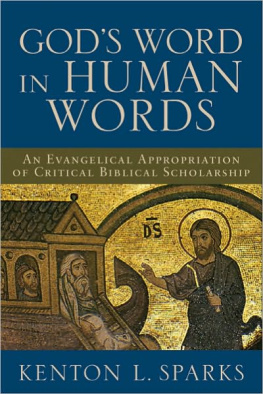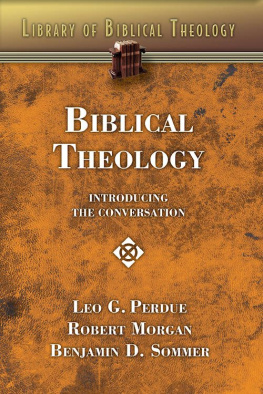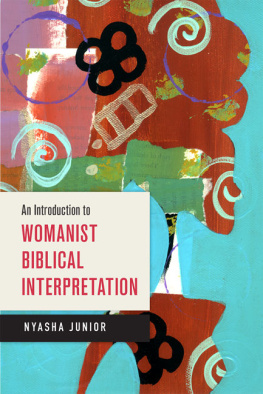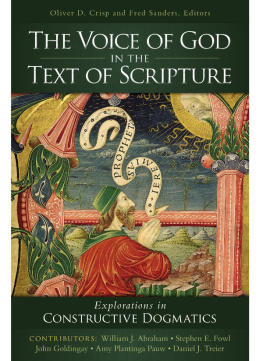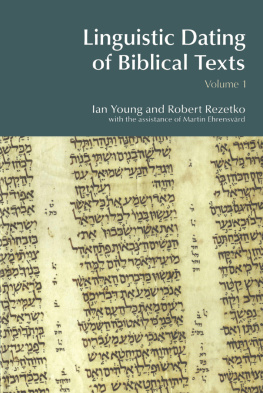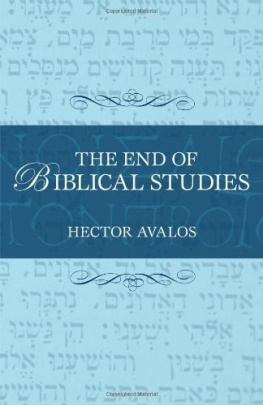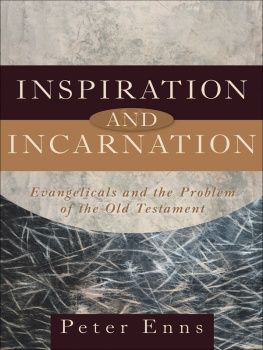Praise for Gods Word in Human Words
This is a fine survey of the issues that historical criticism raises for an evangelical understanding of Scripture and a useful survey of options in approaching those issues.
John Goldingay, David Allan Hubbard Professor of Old Testament, Fuller Theological Seminary
Finally, a fresh, creative, carefully nuanced approach to biblical criticism from an evangelical! Sparks skillfully makes his case for a believing criticism by carefully assessing the current available alternatives. In the process, he offers a useful survey of, and response to, typical hot-button issues. His thorough, methodical work stakes out for many thoughtful evangelicals a credible, theologically based, devout place to stand in integrating critical work and faith. I highly recommend it.
Robert L. Hubbard Jr., professor of biblical literature, North Park Theological Seminary
This important volume provides a bridge between critical scholarship and traditional views on Scripture. Sparkss aim is to present a reasoned and sometimes impassioned insider look at evangelical approaches to biblical scholarship. In the process of surveying the flash points created by modern critical scholarship, he champions practical realism as an approach that provides a more productive middle ground between traditionalist views of authorship and dating of the text, which depend on harmonization or forced interpretations, and the antirealists of postmodern scholarship, who disregard historical context or the original audience. Both evangelicals and nonevangelicals will benefit from this very frank discussion of the history and possible future for biblical scholarship.
Victor H. Matthews, associate dean, College of Humanities and Public Affairs, Missouri State University
Sparks issues an irenic invitation to reconcile academic consensus with evangelical conviction in ways that respect and inform both. His plea for his fellow evangelicals to take historical criticism much more seriously features impressive and honest arguments for mainstream critical stances toward Old and New Testament texts, informative tours of fields from hermeneutics to Assyriology to patristic and Reformation theology, and a bold proposal to affirm biblical inerrancy in terms of perfect divine accommodation to human error. May it encourage and shape the fruitful conversation we evangelicals absolutely need to have.
Telford Work, assistant professor of theology, Westmont College
Kent Sparks asks hard questions. In this volume he provides answers that he believes satisfy intellectually as well as spiritually. His erudition is evident on every page, whether summarizing the epistemological heritage of the Enlightenment, the historical-critical methods as applied to Assyriology, the constructive features of Barthian hermeneutics, or the ways in which the church has trumped Scripture. Of course, not all will agree with his version of practical realism and how it relates to biblical hermeneutics, but few can deny that that he has advanced the conversation in a way that is helpful and healthy.
Bill T. Arnold, professor of Old Testament and Semitic languages, Asbury Theological Seminary
What do we mean when we say our Biblewritten by prophets, chroniclers, sages, evangelists, and apostlesis the word of God? In this book, Kenton Sparks engages that very question, emphatically affirming both the methodology and results of historical and modern biblical criticism and the authority of Scripture. He distinguishes divine inerrancy from the finite and fallible human vessels through whom God chose to reveal Gods Word. The biblical text manifests significant theological diversity that is best addressed by recognizing the distinct genres of human and divine discourse; God accommodates his message to the finite and fallen perspectives of his human audience. While some readers will be uncomfortable with Sparkss characterization of conservative evangelical scholarship and his conclusions regarding the historicity of biblical narratives, this is a valuable window into the progressive evangelical approach to the nature of Scripture.
Elaine A. Phillips, professor of biblical and theological studies, Gordon College
GODS WORD
IN HUMAN
WORDS
GODS WORD
IN HUMAN
WORDS
AN EVANGELICAL APPROPRIATION OF
CRITICAL BIBLICAL SCHOLARSHIP
KENTON L. SPARKS

2008 by Kenton L. Sparks
Published by Baker Academic
a division of Baker Publishing Group
P.O. Box 6287, Grand Rapids, MI 49516-6287
www.bakeracademic.com
Printed in the United States of America
All rights reserved. No part of this publication may be reproduced, stored in a retrieval system, or transmitted in any form or by any meansfor example, electronic, photocopy, recordingwithout the prior written permission of the publisher. The only exception is brief quotations in printed reviews.
Library of Congress Cataloging-in-Publication Data
Sparks, Kenton L.
Gods word in human words : an evangelical appropriation of critical biblical scholarship / Kenton L. Sparks.
p. cm.
Includes bibliographical references.
ISBN 978-0-8010-2701-7 (pbk.)
1. BibleCriticism, interpretation, etc.History. 2. Evangelicalism. I. Title.
BS500.S597 2008
220.601dc22
2007037586
Scripture quotations labeled RSV are from the Revised Standard Version of the Bible, copyright 1952 [2nd edition, 1971] by the Division of Christian Education of the National Council of the Churches of Christ in the United States of America. Used by permission. All rights reserved.
Scripture quotations labeled NIV are from the HOLY BIBLE, NEW INTERNATIONAL VERSION. NIV. Copyright 1973, 1978, 1984 by International Bible Society. Used by permission of Zondervan. All rights reserved.
Scripture quotations labeled NRSV are from the New Revised Standard Version of the Bible, copyright 1989, by the Division of Christian Education of the National Council of the Churches of Christ in the United States of America. Used by permission. All rights reserved.
Scripture quotations labeled KJV are from the King James Version of the Bible.
To my father,
who taught me that God is big enough for our questions
CONTENTS
I RECALL THE MOMENT WELL. I was 14. It was a hot summer evening in the woodlands of Georgia, where I was attending yet another week of Christian service camp. While sitting on a tree stump during the quiet time hour, I read these words from Exodus 6:3: I appeared to Abraham, to Isaac, and to Jacob as God Almighty, but by my name the Lord I did not make myself known to them. Instinctively, I flipped back through the book of Genesis, ready to observe the black-and-white evidence for this, yet another mystery from Scripture. But what I found was not mystery but rather mystery upon mystery. While Exodus clearly said that the patriarchs did not know the divine name, numerous texts from Genesis seemed to confirm that they surely did know that God was the Lord. Although I did not realize it at the time, this was my first bout with historical criticism, or at least with the kinds of data that give rise to historical criticism.
It would be some thirteen years before an answer for this conundrum was inadvertently presented to me, in a set of study notes from the hand of the evangelical scholar Kenneth Kitchen. It was Kitchens purpose to explain why the prevailing notion in biblical scholarship, that Genesis and Exodus were composed from several different sources, was completely wrong. The theory was not entirely new to me. I had heard this theory before from my graduate professor at the University of North Carolina, John Van Seters. Van Seters explained that there were two major sources in Genesis and Exodus, one in which the divine name was known to humanity more or less from the beginning of history, and another in which the divine name was revealed to humanity only at the time of Moses. When these two narratives were combined, he said, this produced the odd effect that I noticed on that old tree stump as a teenager. Of course, I did not believe Van Seters. He was not any sort of evangelical Christian, and I had been warned about the deceptive and beguiling ways of the biblical critics. Paradoxically, it was Kitchen himself not Van Seterswho convinced me that the critics were right.
Next page
